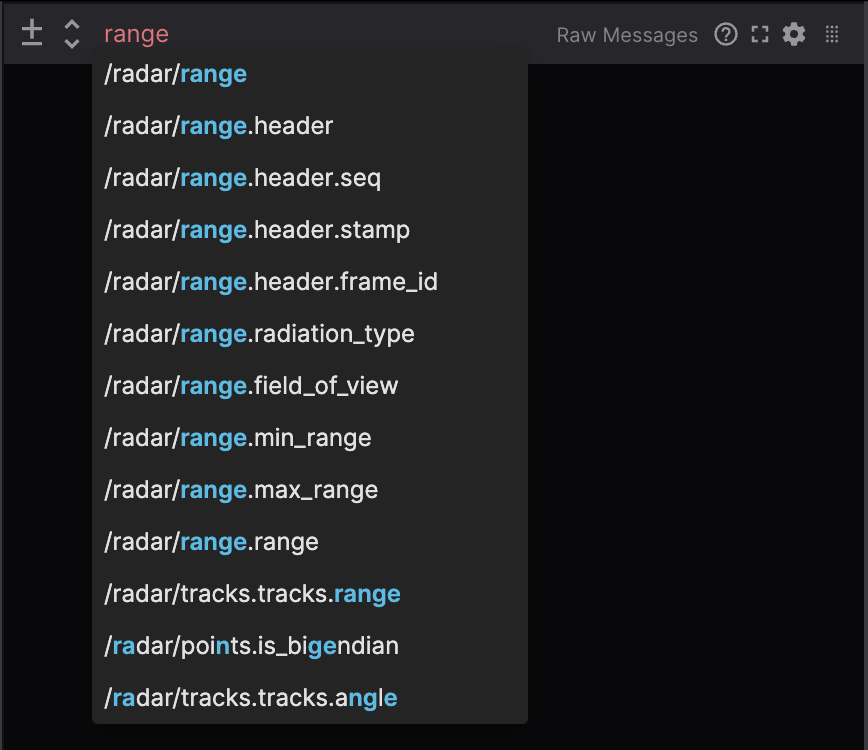Message path syntax
Use message path syntax throughout Foxglove to drill down to the exact information you want to inspect in your data.
Topics and fields
Reference this sample message for the /my_models topic:
{
"total": 4,
"objects": [
{ "width": 10, "height": 20 },
{ "width": 15, "height": 30 },
{ "width": 20, "height": 40 },
{ "width": 25, "height": 50 }
]
}
Specify the topic name to display all messages for that topic:
/my_models =>
{
total: 4,
objects: [
{ width: 10, height: 20 },
{ width: 15, height: 30 },
{ width: 20, height: 40 },
{ width: 25, height: 50 }
]
}
To access nested fields, first specify the topic, then use dot notation . to drill down into a nested field:
/my_models.total => 4
Typing in a message path input field will display a list of matching autocomplete options. Any topics or nested fields that contain the input text will be included in this list.
Indexing into an array
Index into an array with bracket notation:
/my_models.objects[1].width => 15
/my_models.objects[-1].width => 25
Slices
Reference this sample message for the /my_options topic:
{
"colors": [
{ "r": 10, "g": 20, "b": 100 },
{ "r": 15, "g": 30, "b": 50 },
{ "r": 20, "g": 40, "b": 20 },
{ "r": 25, "g": 50, "b": 70 },
{ "r": 30, "g": 60, "b": 90 }
],
"numbers": [3, 5, 7, 9, 10]
}
Slices will return an array of values:
/my_options.colors[1:2] => [{ r: 15, g: 30, b: 50 }, { r: 20, g: 40, b: 20 }]
/my_options.numbers[-2:-1] => [9, 10]
Using dot notation after an array of objects will map through to access each element's nested field:
/my_options.colors[1:3].r => [15, 20, 25]
/my_options.colors[:].g => [20, 30, 40, 50, 60]
Using variables to slice
Slice on a variable by prepending each variable name with a $. For example, setting my_start_idx to 3 and my_end_idx to 4:
/my_options.colors[$my_start_idx:$my_end_idx] => [{ r: 25, g: 50, b: 70 }, { r: 30, g: 60, b: 90 }]
/my_options.colors[$my_start_idx:$my_end_idx].b => [70, 90]
/my_options.numbers[$my_start_idx:$my_end_idx] => [9, 10]
Filters
Reference these sample messages for the /my_books topic:
// message 1
{
stats: {
pages: 100,
author: "Beatrice Potter"
},
readers: [
{ id: 1, name: "Ashley", isCurrentlyReading: true },
{ id: 2, name: "Baron", isCurrentlyReading: false },
{ id: 3, name: "Charlie", isCurrentlyReading: true }
]
}
// message 2
{
stats: {
pages: 210,
author: 'Tommy "Two Gun" Simon'
},
readers: [
{ id: 4, name: "Dana", isCurrentlyReading: true },
{ id: 5, name: "Ethan", isCurrentlyReading: false },
{ id: 6, name: "Frank", isCurrentlyReading: false }
]
}
Filter messages based on their fields’ boolean, number, or string values. The following comparison operators are supported: ==, !=, <, <=, >, >=.
Create filters in message path syntax using curly brackets. Messages that don't match the filter will be skipped entirely:
/my_books{stats.pages>200} =>
{
stats: {
pages: 210,
author: 'Tommy "Two Gun" Simon'
}
}
/my_books{stats.pages==100}.author => "Beatrice Potter"
/my_books{stats.pages==500} => // no value returned
Filtering on nested fields
You can also filter on a message’s nested field values using a combination of slices and filters:
/my_books.readers[:]{isCurrentlyReading==true}.name =>
["Ashley", "Charlie"] // message 1
["Dana"] // message 2
Using variables to filter
In addition to filtering on primitive values, you can filter on variables. Setting variable my_id to 1:
/my_books.readers[:]{id==$my_id} =>
{ id: 1, name: "Ashley", isCurrentlyReading: true } // message 1
// No value returned for message 2
Using multiple filters
When you apply multiple filters, only messages that satisfy all filters will be returned (i.e. an AND expression):
/my_books.readers[:]{id==1}{isCurrentlyReading==true}.name =>
"Ashley" // message 1
// No value returned for message 2
/my_books.readers[:]{id==1}{isCurrentlyReading==false}.name =>
// No value returned for message 1
// No value returned for message 2
/my_books.readers[:]{id==5}{isCurrentlyReading==false}.name =>
// No value returned for message 1
"Ethan" // message 2
Other considerations
Escaping quotation marks in strings is not supported, but you can use single or double quotes, which allows you to express most strings:
/my_books{stats.author=='Tommy "Two Gun" Simon'}.readers[:].name =>
// No value returned for message 1
["Dana", "Ethan", "Frank"] // message 2
Variables cannot be used outside of slicing and filtering in message paths.
